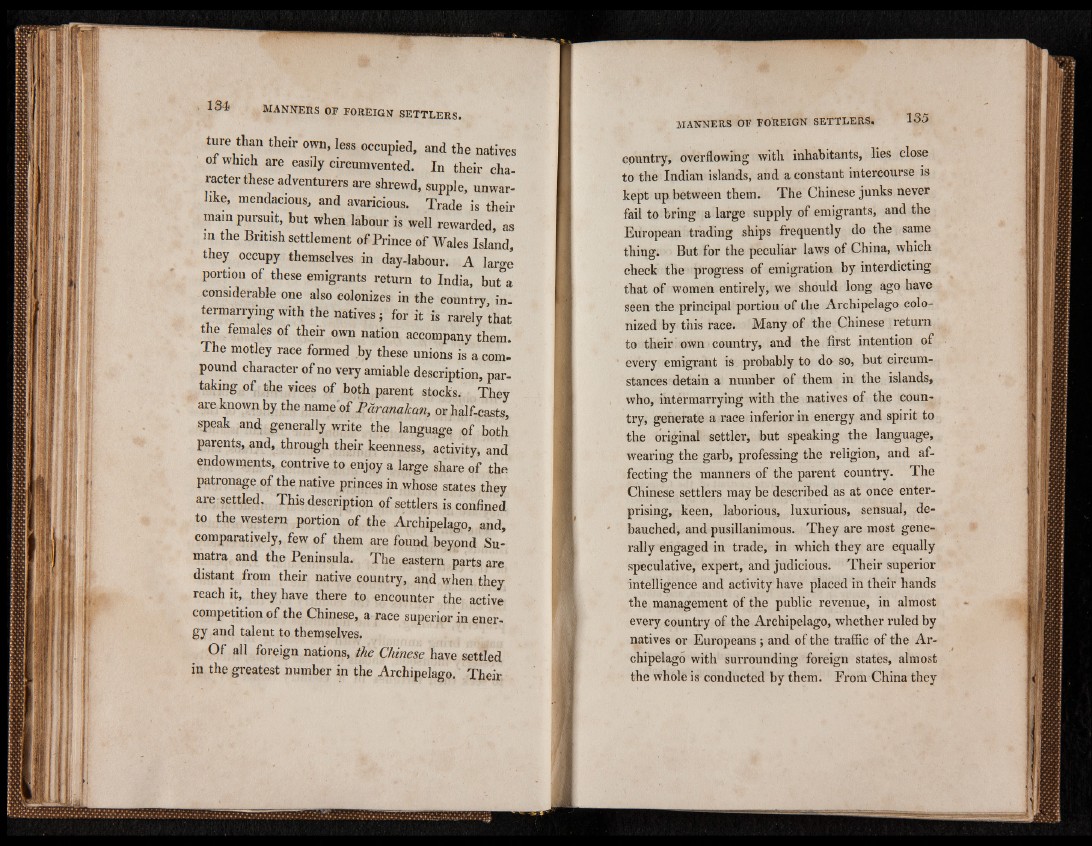
ture than their own, less occupied, and the natives
of which are easily circumvented. In their character
these adventurers are shrewd, supple, unwar-
ke, mendacious, and avaricious. Trade is their
main pursuit, but when labour is well rewarded, as
m the British settlement of Prince of Wales Island,
they occupy themselves in day-labour. A large
portion of these emigrants return to India, but&a
considerable one also colonizes in the eountry, intermarrying
with the natives; for it is rarely that
the females of their own nation accompany them.
The motley race formed by these unions is a compound
character of no very amiable description, partaking
of the vices of both parent stocks. They
are known by the name'of Pdranakan, or half-casts,
speak and generally write the language of both
parents, and, through their keenness, activity, and
endowments, contrive to enjoy a large share of the
patronage of the native princes in whose states they
are settled. This description of settlers is confined
to the western portion of the Archipelago, and,
comparatively, few of them are found beyond Sumatra
and the Peninsula. The eastern parts are
distant from their native country, and when they
reach it, they have there to encounter the active
competition of the Chinese, a race superior in energy
and talent to themselves.
Of all foreign nations, the Chinese have settled
in the greatest number in the Archipelago. Their
country, overflowing with inhabitants, lies close
to the Indian islands, and a constant intercourse is
kept up between them. The Chinese junks never
fail to bring a large supply of emigrants, and the
European trading ships frequently do the same
thing. But for the peculiar lawis of China, which
check the progress of emigration by interdicting
that of women entirely, we should long ago have
seen the principal portion of the Archipelago colonized
by this race. Many of the Chinese return
to their own country, and the first intention of
every emigrant is probably to do so» but circumstances
detain a number of them in the islands,
who, intermarrying with the natives of the country,
generate a race inferior in energy and spirit to
the original settler, but speaking the language,
wearing the garb, professing the religion, and affecting
the manners of the parent country. The
Chinese settlers may be described as at once enterprising,
keen, laborious, luxurious, sensual, debauched,
and pusillanimous. They are most generally
engaged in trade, in which they are equally
speculative, expert, and judicious. Their superior
intelligence and activity have placed in their hands
the management of the public revenue, in almost
every country of the Archipelago, whether ruled by
natives or Europeans ; and of the traffic of the Archipelago
with surrounding foreign states, almost
the whole is conducted by them. From China they